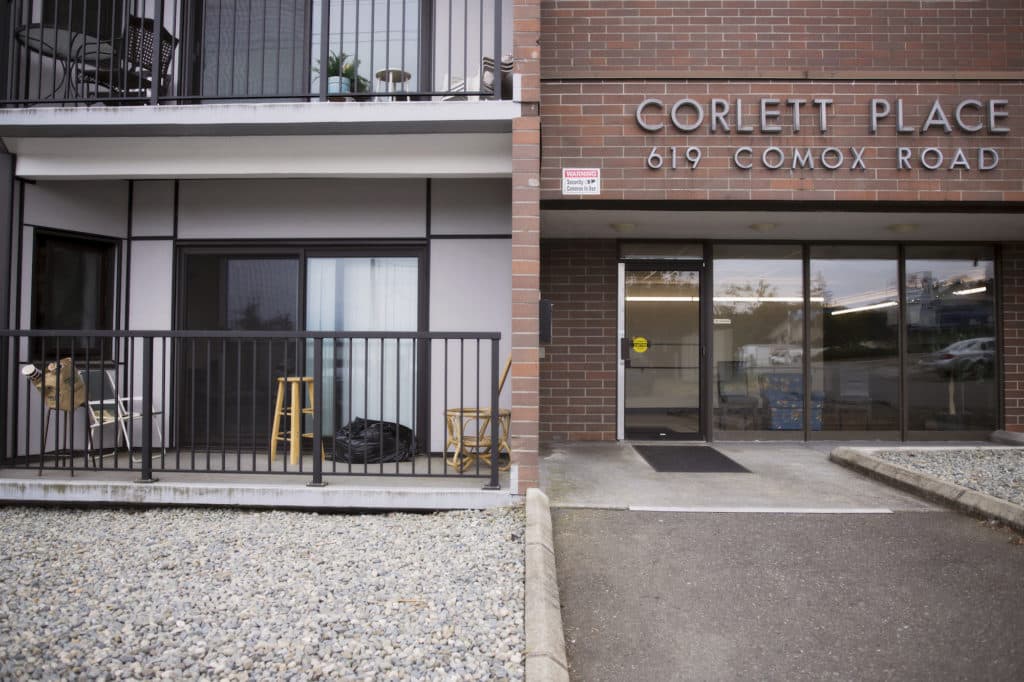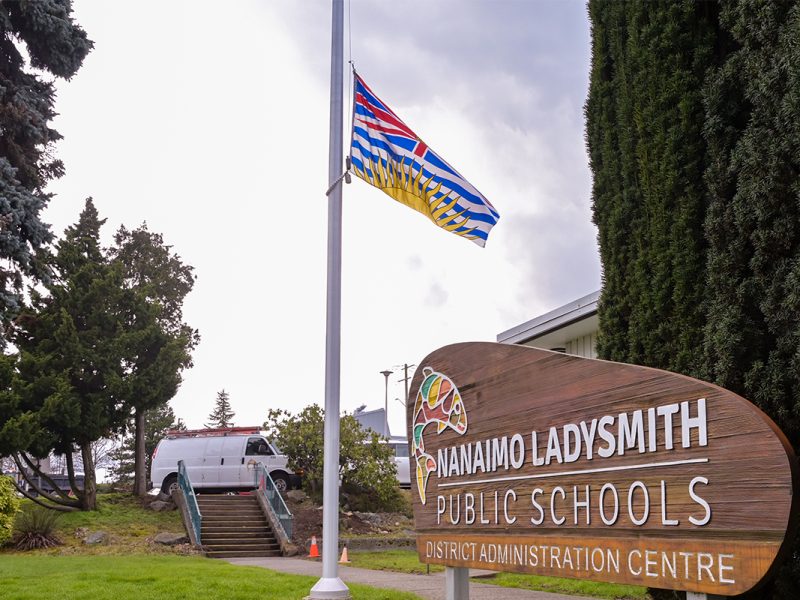
The Discourse has been investigating allegations from tenants about Nanaimo Affordable Housing Society (NAHS), which range from intimidation and harassment to assault, being unfairly targeted for eviction and the unauthorized removal of funds from tenant accounts for services they never agreed to.
Read more: Tenants allege bullying by non-profit housing provider
Curious about some of the legalities of issues like rent increases during COVID and removing funds from tenants’ accounts, I had an in-depth discussion with Robert Patterson, who works as a lawyer at the non-profit Tenant Resource and Advisory Centre (TRAC). The organization provides free legal education, representation and advocacy on residential tenancy matters. Responses have been slightly edited or condensed for clarity.
JC: Some tenants claim that money was taken out of their bank accounts by their housing provider. Is that allowed?
RP: No agreement and still taking the money is extra bad. I think generally speaking, you need to be able to have a legal entitlement to the rent that you collect.
It sounds like the tenants might be set up for pre-authorized debit (PAD)? I despise pre-authorized debit, as a matter of practice. It puts tenants absolutely on the back foot. I’ve heard cases where tenants have broken a lease, moved out early and said, ‘The tenancy’s over,’ and the landlord just keeps the rent.
What can you do? It’s painful to try and cut someone off from PAD once you’ve established it, or tenants won’t know how to do it and then there goes another month of rent.
In a situation where a landlord is the one collecting rent through PAD — a landlord needs to show they have a legal right to take it. If they take that money without the tenant agreeing to it in their contract, that’s pretty clearly a breach of the agreement. And a tenant can always file with the Residential Tenancy Branch (RTB), and ask for an order that the landlord return the money.
JC: What are some strategies that renters can use to deal with concerning charges from their landlord?
RP: As a general practice, tenants should avoid signing up for PAD with landlords and if it’s unavoidable — as many landlords require it as a condition of renting — exercise caution.
In a situation where a number of tenants have the same complaint — for example about the Shaw package charge — an effective strategy may be to join their applications together and have it heard as a group case to get sort of one consistent decision that looks at all the evidence.
Don’t sign anything unless you can read it, you’re sure that you agree with everything it says, and you plan to be bound by the terms of the thing you sign.
JC: What about rent increases during COVID-19?
RP: Under the rent freeze during COVID-19, a landlord was no longer allowed to issue a notice of rent increase, but in some cases where both parties mutually agreed to change their rental amount, or the terms of their agreement regarding services, rents may still have been increased.
Whether or not it was done properly is really up to an arbitrator to decide. If the tenants are considering that they felt either that it was an increase they couldn’t refuse, it might be an illegal increase, that there was some kind of duplicity in how it got assessed, or it was done improperly, they have the right to challenge that at the RTB.
The best way to present the argument depends on the specific facts of the case. So it’s hard to say for sure, and it can go down many complicated rabbit holes. But if tenants believe that their rent was adjusted in a way that was not permitted, they can make a claim for monetary compensation at the RTB and ask that an arbitrator review their contracts.
JC: In one case I looked at, a single mother of three was evicted over what amounted to less than $1,000. In another case, the amount in question at the end was a few hundred dollars.
When we consider the cost of then putting people into shelters, this seems like an inefficient way to do things?
RP: There’s definitely a lot of unfairness baked into our eviction process in general in B.C., and I think you’ve struck upon one part of that, which is that our non-payment of rent eviction procedure is incredibly brutal. There is very limited room for arbitrator’s discretion, there’s very strict requirements. It’s that a tenant has to owe any amount.
What we often say to tenants when we do our seminars or webinars to get information is, ‘You can get a notice to end tenancy if you’re one day late and one dollar short. And if you don’t do anything, your tenancy will almost certainly be over.’
So much onus is put on tenants, even in cases where they actually don’t owe the money, or have a reasonable argument that they don’t owe the money.
Firstly, it’s on [the tenants] to actually begin that process, to get a decision-maker to look at it and make sure the eviction is actually justified. And then if they do that, they run up into this incredibly draconian set of rules about how evictions are ended for non-payment.
Or, if they just can’t avail themselves of their legal rights and responsibilities in terms of how to figure it out within the five calendar day window, then their tenancy is over. And they have to move. And oftentimes, it can be incredibly unnecessary. So much additional cost and stress to those tenants’ lives.
TRAC is currently participating in a research project at the University of British Columbia to analyze what impact eviction has on people’s lives, but we already know about the negative outcomes, such as loss of employment, negative health effects, increased chance of dying.
Eviction is just a terrible thing for people. And the way that evictions in general are written in B.C. is that the harm to the tenant is, generally speaking, not not even considered. What really matters, especially in a non-payment eviction, is simply any financial harm to the landlord, even if it’s just a dollar.
Even if you don’t care about tenants, think about what a waste of our collective resources, to have someone have to move their community, probably potentially lose their employment — you lose that productivity, you add all this time and effort and expense they have to go through, that isn’t productive, just to try and move somewhere to find some new housing. And in many cases, they find something that’s completely unaffordable.
As we allow people to be evicted, and we push people out of their communities and into higher rent places, that has a macro economic impact. People have less to spend on the things that actually drive the economy, as more cash is just taken up by rent-seeking investors who own these properties.
Even if all we care about is just having a fair and reasonable eviction process, we don’t even have that. Compared to other provinces, in B.C. our rules on evictions, especially non-payment evictions, are incredibly draconian.
From my recollection, almost every other province has longer redemption periods or longer periods that a tenant is given to pay back the money owed. Or at least some level of discretion, a higher level of discretion, that arbitrators are allowed to exercise in deciding whether the tendency really needs to end.
Let’s say a tenant gets laid off through no fault of their own, they lost their employment, they can’t afford rent. If they’re short on rent that month, there’s nothing they can do. The landlord can issue a 10 day notice and if [the tenant] disputes it — if they go to a hearing and say, ‘I couldn’t pay it because I didn’t have a job, but in the meantime I’ve gotten the job and I’ve paid back the arrears’ — if they didn’t pay the arrears back within five days of getting the notice, even if they fully indemnify the landlord, the arbitrator has very little and probably zero discretion to say, ‘Okay, we’ll cancel the notice because this tenancy can actually continue now.’
Which is completely irrational. It just makes no sense. But eviction rules are written to deliver a vacant position to landlords as easily and quickly as possible.
JC: How can we better understand the challenges that organizations like NAHS struggle with?
RP: I certainly share the impulse that the best intentions of nonprofit housing organizations is to provide housing for people who desperately need it and can’t afford it on the market. They fill an important gap. And it’s important that they provide that.
But at the end of the day, they are landlords. They’re not subject to the same market pressures that for-profit landlords are subject to — but they’re still subject to many of the same pressures.
A lot of these problems will stem originally from a lack of funding. I think it might be especially common with places that are expanding.
It kind of reminds me, in a more benevolent way, of the Atira Women’s Resource Society in Vancouver where they’ve gone taking over building after building and the result is, it’s stretched them a bit thin. It’s led to staffing problems, [as well as financial mismanagement and safety concerns] at many of the buildings they manage.
One question this all raises is, can a small organization scale up that quickly, on the kind of tight margins that non-profit housing often has?
And the response to some of this has to be more funding. Many of these non-profit housing providers are often put in challenging situations where they have to deliver a certain level of service or a certain suite of services, that under the operating agreement [with B.C. Housing] they’re required to do, but it may not be really feasible to do that, or if not comfortable, certainly, to do that on the budget that they have to do it within.
So they get pushed into situations where they might be looking for places to cut costs, or to gather a little extra revenue. And that’s no excuse, certainly, for different kinds of attempts to dip into tenants’ pockets, because when you’re providing affordable housing to low income and vulnerable tenants, the last thing we should be doing is engaging in a classic ‘robbing Peter, to pay Paul’ situation.
But — putting on my most sympathetic hat — I can see why a lot of them might be driven to that kind of thing. But I think it’s a sign that there just needs to be significantly more funding for affordable housing and for general non-market housing in the province.
I mean, imagine a world where you have a decent supply of affordable housing stock, both in the private and non-profit spheres. You know, if you had a building that was having issues like this, where landlords were repeatedly issuing eviction notices to get out certain tenants, the answer to that would be, ‘Well, I’m just going to not put up with this, I’ll move to a vacancy in the next building.’
But of course, we don’t have that healthy sort of approach to housing, where we’ve been cultivating it and making sure we have affordable and adequate housing.
Instead, we’ve treated it as a commodity and everyone’s just trying to cling on to whatever they can find, because the threat of homelessness is pretty much constantly hanging over everyone’s heads.



